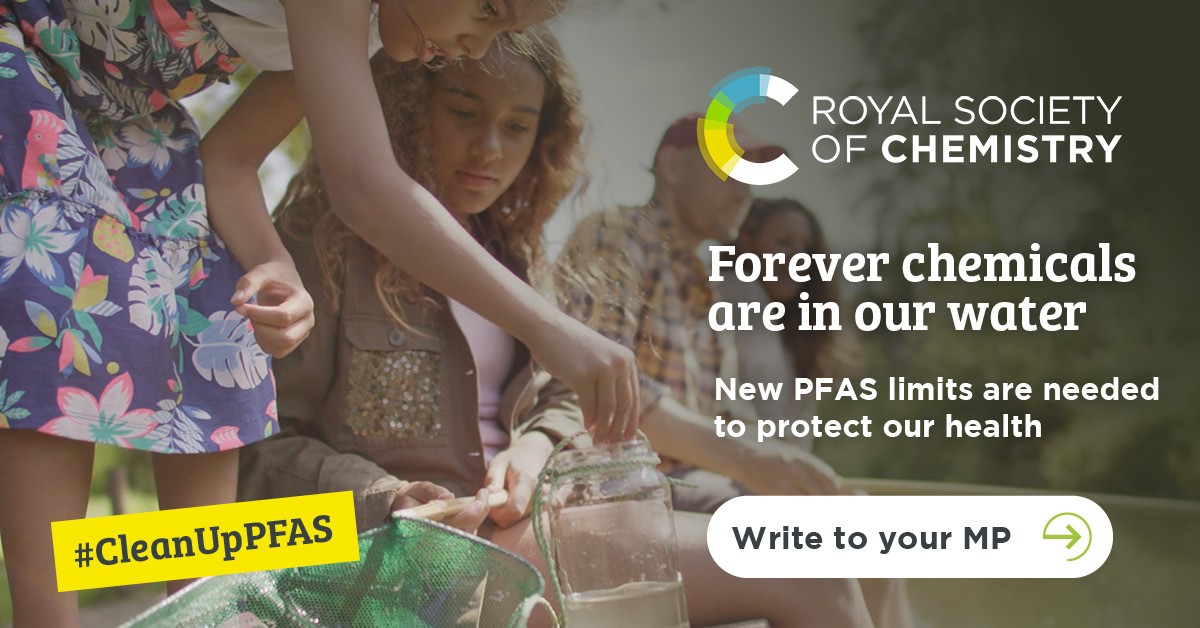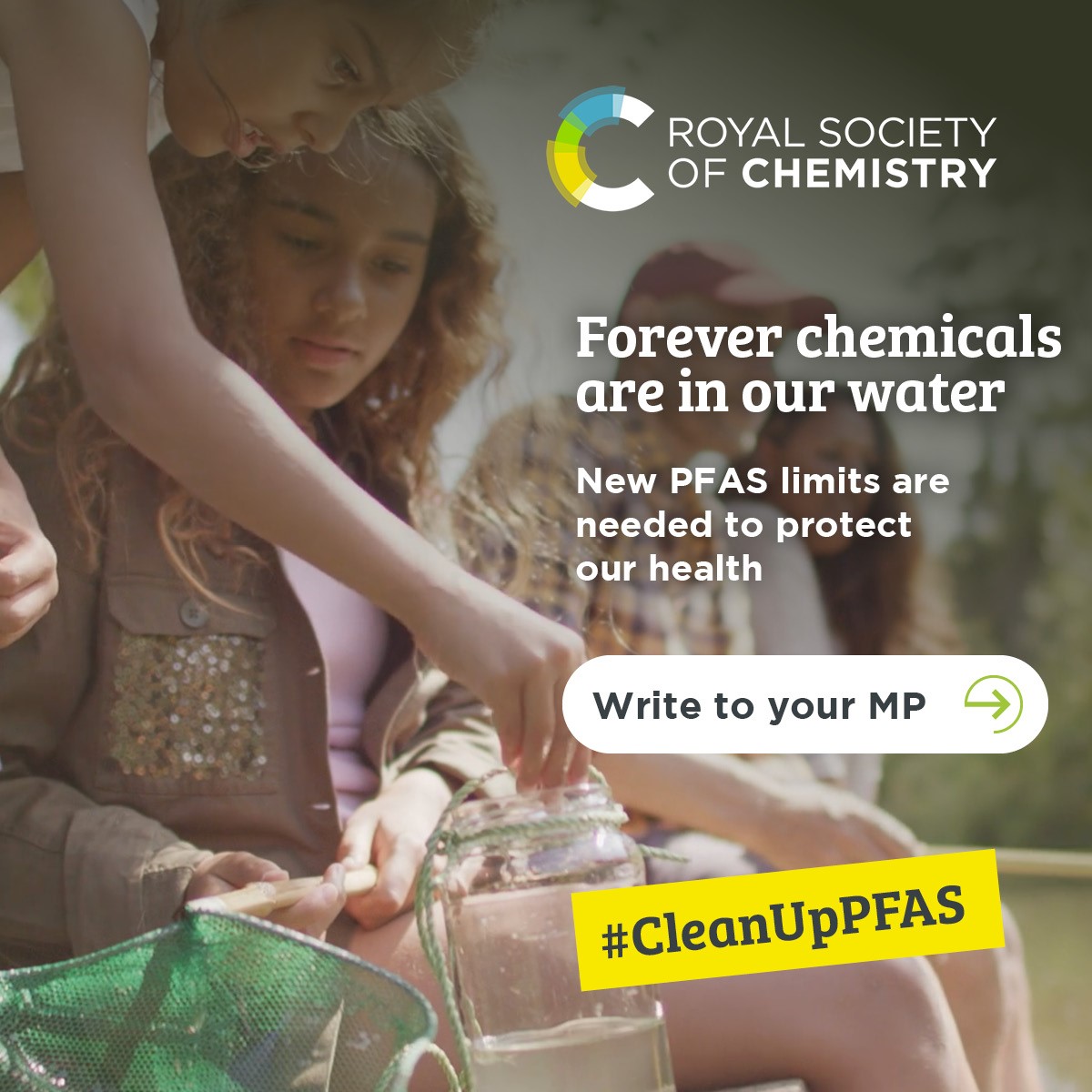Opinion: It's time to clean up the UK's half-hearted approach to PFAS regulation to protect public health and our environment
Stephanie Metzger (pictured right), RSC Policy Advisor on Sustainable Chemicals, explains why recent changes to 'forever chemicals' need to be taken one step further and put into law.
As MP Munira Wilson reads her Private Members Bill on PFAS today, we can now confidently say that health concerns surrounding these so-called ‘forever chemicals’ are no longer a niche scientific topic, but a genuine issue of concern for the UK public.
In early 2025 the 新月直播app下载 will release the results of a YouGov survey they commissioned, the results of which explore nationally representative public attitudes to PFAS. Initial analysis of the data tells us that more than three quarters (77%) of people in the UK believe that some, most or all PFAS present a significant risk to human health.
Over three quarters (88%) say that the use of PFAS known to be toxic should be stopped immediately or subject to more effective controls. And the most popular PFAS control measure the UK public would accept is increased regulation on industries using PFAS, requiring them to reduce and reverse contamination caused by their processes, with 84% saying they would support this.
However, there is a lack of coordination across government when it comes to dealing with the many issues surrounding the use of PFAS, from drinking water to environmental and consumer product-related issues.
One good example of the current fragmented approach is a piece of good news that quietly snuck out in August, unnoticed by anyone outside of the water industry. The news itself was a change in technical guidance provided to water companies that essentially means every resident of England and Wales should now be better protected from harmful PFAS in their drinking water.
After a year of campaigning for tighter restrictions on PFAS in UK drinking water in my role at the 新月直播app下载, this update from the Drinking Water Inspectorate (DWI) felt like a massive win.
The guidance to water companies makes it clear they will be expected to monitor for and enforce a limit of 100 nanograms per litre (ng/L) for a new cumulative sum of 48 PFAS as part of their legal duty to deliver ‘wholesome’ drinking water to households.
Currently, water companies measure whether drinking water samples exceed 100 ng/L for each of the 48 individual types of PFAS, which means the total amount of PFAS could accumulate far beyond the high-risk threshold.
The updated limits, which take effect from January 2025, mark a significant new safeguard for public health that surpasses drinking water limits in both the European Union and Scotland, where the same 100 ng/L is enforced for a much smaller group of 20 PFAS.
So why is this good news a little bittersweet?
A lot of it is due to the terminology around our drinking water protections. ‘Guidance’, ‘wholesome’ and ‘expected to’ don’t exactly provide the comfort and certainty we may expect when it comes to what we and our families drink every day.
While we laud the DWI's new PFAS guidelines for laying out a more comprehensive limit than even the EU, in comparison our laws still lack clarity. The existing regulation itself is vague, with water companies being required to provide water the DWI considers 'wholesome' – the parameters of which are defined by guidance such as the recent PFAS expectations.
The positive side of this approach is that the DWI can act decisively in line with the latest scientific understanding – put simply, water companies must now follow the new guidelines or risk enforcement action via the wholesomeness rules. It is an immediate, positive step to protect public health.
But we shouldn’t stop there. No-one chooses the water that comes out of their tap, so we want to see statutory PFAS limits for UK drinking water that are clearly and transparently defined and legally enforceable. We need to translate this new guidance into legislation that gives the regulator Ofwat defined criteria – and the power – to hold water companies to account.
It's not just our YouGov survey that shows this issue matters to the general public. Since we at the 新月直播app下载 launched our ‘Clean up UK drinking water’ campaign last year, which highlighted the prevalence of PFAS in our water courses, over 10,000 people have seen our campaign map showing PFAS in their local area and close to a thousand wrote to their MP highlighting the issue.
It seems this public pressure is starting to make waves. For instance, while debating the , Baroness Bennett of Manor Castle noted: “Public awareness of PFAS and ‘forever chemicals’ is growing fast; the Government are going to find themselves coming under considerable pressure in these areas very soon.”
In the meantime, chemicals continue to accumulate in our rivers, aquifers and environment. We don’t actually know how many PFAS are being produced, and where they end up – so we also urge government and industry to build upon this change by creating a national inventory of PFAS and enforcing stricter limits on industrial discharges.
Ultimately, at the RSC, we want the government to establish a national chemicals regulator that can provide better strategic coordination, monitoring, and regulation of all chemicals, including PFAS. With a harmonised and comprehensive approach, we ensure everyone connected to the chemical sciences is doing everything they can to protect our health and our environment.
Related content
Our evidence report
Are there possible solutions?
Read our evidence report to understand more about PFAS, the three questions to which we must find answers, and the work that has already gone into tackling this issue.
Learn more about the problems associated with forever chemicals and the potential ways to address this crisis.
Help spread the word
Download the image to share on social media and encourage your friends and family to join our campaign for safer drinking water.

@RoySocChem is urging the Government to overhaul its drinking water standards to limit forever chemicals linked to cancer, fertility issues and other serious health impacts. Join our campaign at [] ![]() Download image for Twitter and Facebook
Download image for Twitter and Facebook

@RoySocChem is urging the Government to overhaul its drinking water standards to limit forever chemicals linked to cancer, fertility issues and other serious health impacts. Join our campaign at [] ![]() Download image for Instagram
Download image for Instagram
*nanograms per litre. One nanogram is a weight measurement equal to 0.000 000 001 g
Press office
- Tel:
- +44 (0) 20 7440 3351
- Email:
- Send us an email
Contact us
- Email:
- The Policy and Evidence Team
